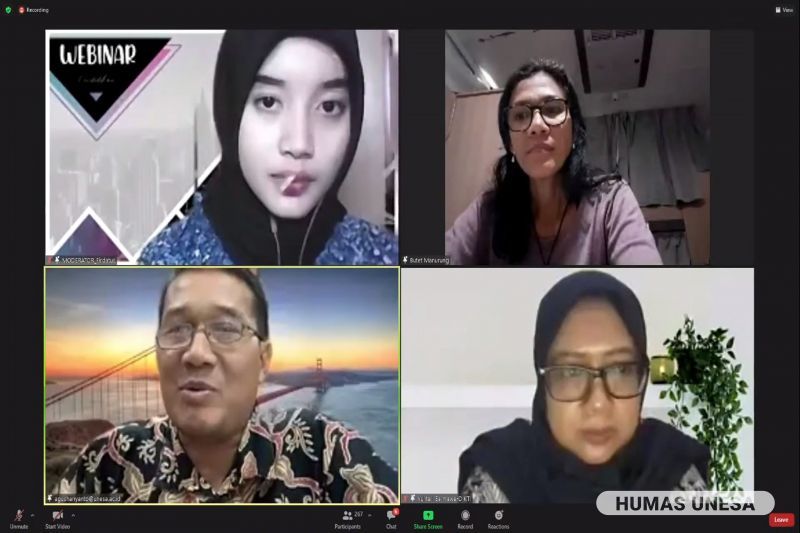
www.unesa.ac.id
Unesa.ac.id, Surabaya-The Ministry of Education of the State University of Surabaya (UNESA) BEM held an educational webinar on Thursday (06/05/2021). The theme raised was "The Condition of Higher Education in Indonesia during the Covid-19 Pandemic.
According to the head of the event organizer, Yoga Perdana, education during the pandemic was deliberately used as a central issue for the momentum of the national education day and the reality of the implementation of education during the pandemic, which for him needs to be studied from many sides, including educational policies and the use of technology during the pandemic. .
"With this event, we also want to have a discussion about how effective online learning has been and its impact on educational institutions, teachers and students or students. It is hoped that the participants will get an overview and the results can be used as material for further studies and recommendations for stakeholders, "said President of BEM Unesa Ahmad Yusuf Alhakim.
The speakers present were Yulita Priyoningsih, S. Sos, Head of the Distance Education Section, Directorate of Special Learning Sub-Coordinator Learning, Directorate of Learning and Student Affairs, DIKTI. In addition, there is also Butet Manurung, Director of the Sokola Institute.
Vice Rector for Student and Alumni Affairs, Dr. Agus Hariyanto, M.Kes in his speech said that the issue of education during the pandemic indeed needs to be examined together. Education, which was initially face-to-face, had to be temporarily suspended and later education or distance learning (PJJ) was held during the new normal period.
During the implementation of PJJ for one year, there are several notes. Agus appreciated the steps taken by BEM Unesa in organizing the webinar, which according to him could outline the problems of implementing PJJ during the pandemic and how to make new steps in implementing education in the future.
"Hopefully the pandemic will pass soon and face-to-face learning can begin next semester," he hoped. "In the midst of conditions like this, we must remain optimistic and able to adapt, that's the most important thing," he continued.
On that occasion, Yulita Prianingsih explained material about education transformation through distance education policies. Initially he presented the survey results with a total of 87,600 respondents. It turns out that online learning does not increase student motivation, interest and interest in learning. However, the positive thing is that it can improve students' ability to manage time and improve their ability to understand learning material independently.
He also mentioned that about 80.2 percent of the respondents still wanted to study online, but also wanted face-to-face meetings. These two things are accommodated by the blanded learning method (online and offline) which can be applied in the future.
"Even though the pandemic is over, online learning is likely to continue to be implemented, even though offline learning is starting to be implemented. Therefore, the hybrid or blanded method is the main alternative in conducting lectures or learning in the future, "he said.
In the second material session, Butet Manurung conveyed about the condition of education in Indonesia during the pandemic with the case study "Sokola Rimba". During a pandemic, the real ones that have the most impact are urban communities.
Then the communities that can survive are those that have high food security and social capital such as indigenous peoples. "Regarding education and technology, sometimes jungle people think, in higher education, they learn higher science, but the water channel beside the campus is clogged because of garbage," he said.
According to him, the ideal education and learning is one that has a direct impact on solving the problems of life around. Jungle people view education as not what urban people understand.
The educational philosophy for jungle people looks more at the balance between humans and humans, humans and creators, and humans with the environment. "Meanwhile, the ideal life for jungle people is intact and customary forests are maintained," he said. "Education must provide space for that, if the conversation is lost, diversity is lost, and the earth will also go away," he continued.
According to this Unpad alumnus, education must indeed be the foundation of the integrity of the Indonesian nation's resilience. However, it must be remembered, the resilience of a country lies in the resilience of each of its smallest communities, not vice versa.
"In order to have resilience, communities are given space to develop according to their natural and cultural potential. Supporting them to love themselves, knowing the world around them, we even have to learn from them and the function of education should be in that realm, "he concluded. The webinar event which was attended by hundreds of participants from Unesa and other campuses ended with a question and answer session and interactive discussions between the speakers and participants. (QQ / zam)
Share It On:






